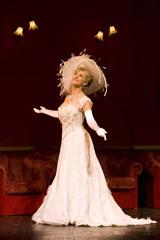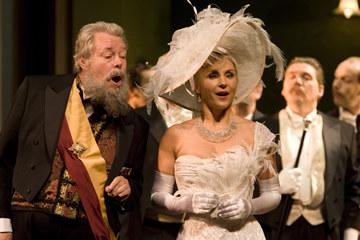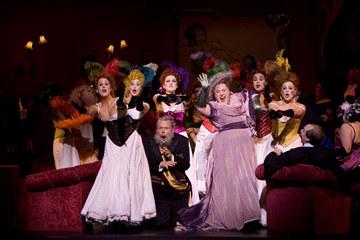Lehàr,
The Merry Widow:
(new production in English) soloists, Chorus and Orchestra of
Welsh National Opera, Michal Klauza, Wales Millennium Centre,
Cardiff 8.10.2005 (BK)

Lesley
Garrett as Hanna Glawari
Over the last ten
years or so, in terms of pleasure per travelling mile, my favourite
opera companies have been in Helsinki and in Cardiff. Since
I live in the UK, I get to Welsh National Opera more than Finland
but the equation still balances out nicely.
WNO has launched
some fine productions over the last few years, including a magnificent
Parsifal,
a modern dress Traviata
(which unlike some reviewers, I enjoyed enormously) and
last season's excellent
Ariadne,
Wozzeck
and Iolanta.
It's a genuine
delight to have such high-quality opera on my doorstep (more
or less) and at its best, there's no doubt that WNO is a world
class company.
But things can go
sadly wrong on occasions and this Merry Widow was one
of them. With very few crêpes joyeuse about and
not even much champagne, there's too little gaiety in this version
of belle époque Paris. It's leaden, it looks amateurish
and some of the cast can't sing.

Donald
Maxwell (Baron Zeta ) and Lesley Garrett
A
good part of the problem lies in Patrice Caurier and Moshe Leiser's
production. Though stating that this is a 'traditional' setting,
these experienced opera directors believe that there are real
parallels between Hanna Glawari and Richard Strauss's Marschallin
from Der Rosenkavalier. Both have been hurt in previous
relationships, they say, and so the Merry Widow is
a 'bitter-sweet' comedy suffused with the genuine elegance of
pained people who refuse to show their wounds. With these sentiments
though, and with the deliberately seedy depiction of the impoverished
Pontevedrian Embassy in Act I and the luridly over-brothelised
version of Chez Maxim's in Act III (complete with Egon Schiele
paintings), the result is a plodding presentation from which
most of the the joy seems to have been perversely extracted.
Oh,
lighten up gentlemen please, and let's just have
fun for once. This is operetta after all, where we
all know from the outset that everything turns out fine.
We want the tunes, the silly jokes and plain old-fashioned romance
- not 'significant' weltschmerz that's good for the
soul in the end.
Although Jeremy
Sams has done his best with the English translation, there's
a deal too much spoken dialogue in this production (especially
in the first act) and jokes don't come fast or furious enough
to make the action bounce. The result is a kind of slow pantomime
delivery in which timing is generally stilted (not to say wooden)
so that even the most gifted singer-actors have some difficulty
getting their words out. The exception was Geoffrey Dolton whose
Adams Family-ish Njegus made the only true comic character of
the evening.

The
Grisettes, Donald Maxwell and Linda Ormiston (Mme Praskowia)
Lesley Garrett (who looked
appropriately glamorous in the costumes designed for her by
Agostino Cavalca and who also managed to enter perkily into
the originally intended spirit of the piece) sang with great
power when needed but clearly was having difficulties in quieter
passages. Although ' Vilja ' - the show stopper in Act II -
went well enough and though her ensemble singing was also fine,
there was a persistent sense that she has been in front of microphones
too long. Her judgement of the hall's acoustic seemed to desert
her on several occasions: a pity since her performance was otherwise
splendid.
Chronic inaudibility was
also a problem for some the other principals including Ailish
Tynan (Valencienne) unusually, although she too seemed
inhibited by the production. But the top prizes for conspicuous
vocal absence beyond the call of duty, went unequivocally to
Tracey Wellborn (Camille) and to Jeffery Black (Danilo) neither
of whom could be called impressive with the best will in the
world.
Despite Michal Klauza's spirited conducting and the stalwart contributions
of WNO's regulars in the other principal parts, this was the one
of the least successful productions I have ever seen at WNO. It
caused me to wonder once again (as I have done before) about why
the company persists in buying in so many relatively unknown singers
for principal parts, when they have such a wealth of talent within
their corps of regulars and in their remarkable chorus. This is
the practice in Finland where the policy works admirably.





